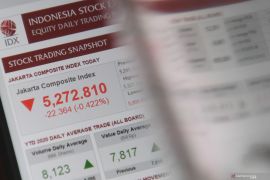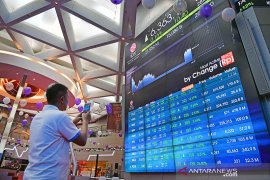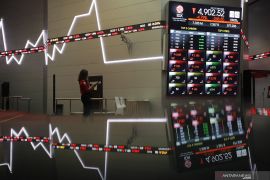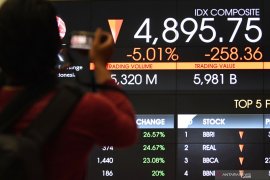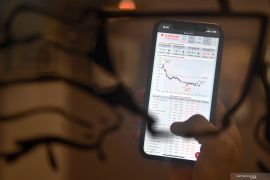The index of the Indonesian Stock Exchange (BEI) rose 15.84 points to 4,546.28 points, with index of 45 most liquid stocks up 0.54 percent to 790.06 points.
"The index rose although trade volume was relatively low," Reliance Securities analyst Lanjar Nafi said here.
Lanjar said foreign exchange reserve data for Dec. 2015 had triggered the rise in the index.
The foreign exchange reserves as released by Bank Indonesia rose to US$105.93 billion in Dec. 2015 from US$100.24 billion in the month before.
The rise in the foreign exchange reserves was significant to finance imports and service foreign debts and to drive economic growth in 2016, he said.
Chief researcher of Universal Broker Indonesia Satrio Utomo said the upward move of the BEI index was limited as the market players chose to wait and see indicating that the sentiment in the financial market is not yet conducive.
He said the uptrend of oil prices though below e3xpectation was enough to give positive effect on the market players in the stock market in the country.
In addition, there was hope among the market players that the central bank would cut its benchmark interest rate (BI rate) this year.
In Fridays trade, there were 199,292 transactions with 2.42 billion shares valued at Rp4.06 trillion changing hands.
Gainers were outnumbered by decliners by 124 to 159 shares with 93 shares unchanged.
Regional markets such as Hang Seng and Strait Times recorded an increase in index but Nikkei recorded a decline .
Meanwhile, rupiah also regained some of its loss in value against the U.S. dollar closing at the level of 13,844 to the U.S. dollar gaining from earlier level of 13,927 per dollar.
Rully Nova, a financial market observer from Bank Himpunan Saudara here said data of the country foreign exchange reserves were one of the factors pushing up the national currency.
"Part of the market players took advantage of the sentiment to accumulate rupiah," he said.
Other positive sentiments in the country are inflation being well under control and government pledge to accelerate capital spending especially on infrastructure, he said.
Executive Director of Bank Indonesia Tirta Segara attributed the increase in foreign exchange reserves to new foreign debt received by the government, export earning and global bonds issued by the government.
The foreign exchange reserves were enough to finance imports for 7.7 months or imports and service government debt for 7.4 months -- well above the international adequacy standard of three months.
He said for Bank Indonesia the foreign exchange reserves are enough to ward off external threat and maintain sustainability of economic growth. (*)
Editor: Heru Purwanto
Copyright © ANTARA 2016





